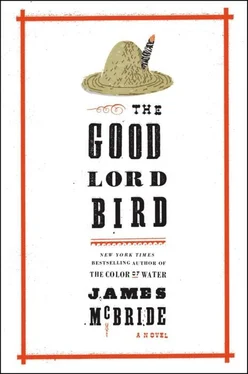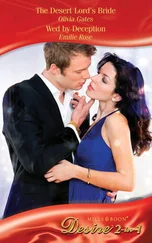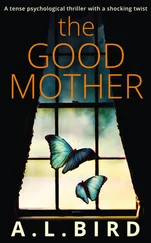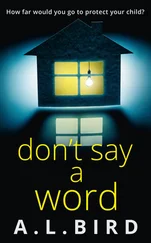Cook led me around to the back side of the station and down the entire length of the train. When we reached the last car, he split off into the thickets and headed down toward the Potomac, to the water’s edge. The Potomac runned underneath the railroad tracks. It was pretty dark down there, nothing to see but the swirling water in the moonlight. He pointed to the riverbank. “Feller wants to talk to you down there. Alone,” he said. “These coloreds is distrustful.”
He waited up at the top of the bank while I moved down to the bank of the Potomac. I sat there and waited.
A few minutes later, a tall, hulking figure emerged from the far end of the bank. He was a right-powerful-looking man, dressed in the neat uniform of a railroad porter. He didn’t come right up on me, but rather stayed in the shadow of the railroad trestle as he come closer. When he seen me, he didn’t come closer but stopped a few feet off and turned and leaned on the trestle, staring at the river. Above us, the train gived a sudden clank and burst of steam, its valves and all clacking thusly so, blowing that steam. I jumped as I heard it, and he glanced at me, then looked away back toward the river again.
“Take ’em an hour to get the steam up,” he said. “Maybe two. That’s all the time I got.”
“You the Rail Man?”
“It don’t matter what I am. Matters what you is. What are you?”
“I’m a messenger.”
“So was Jesus. You ain’t seen Him running ’round in a skirt and bloomer panties. Is you a girl or a boy?”
“I don’t know why everyone’s huffing and puffing ’bout what I am,” I said. “I’m just carrying a word.”
“Bringing trouble is what you doing. If a body ain’t sure, it’ll cost you.”
“What I done wrong?”
“I understands you is looking to buy some of the Coachman’s brooms. We carries them to Baltimore and beyond,” he said.
“Says who?” I asked.
“Says the Blacksmith.”
“Who is he, anyway?”
“You don’t wanna know.”
He stared across the water. By the light of the moon, I could see the outline of his face. He looked to be a friendly-faced feller, but his face was strained and tight. He weren’t in no happy mood.
“Now I’ll ask it again,” he said. He glimpsed over his shoulder at Cook, who watched down on us, and then back at the water. “Who are you. Where you from. And what you want.”
“Well, I don’t reckon I know what to say to you, for I done told it twice already.”
“When you roll up on a watery mouth like the Coachman’s wife, hooting and hollering ’bout insurrection, you better state yourself clean.”
“I weren’t hollering ’bout insurrection. I just told her I knowed how to read.”
“That’s the same thing. You keep quiet ’bout them kinds of things ’round here. Or you’ll have the Blacksmith to deal with.”
“I ain’t come all the way down here for you to throw threats at me. I’m speaking for the Captain. I ain’t got nothing to do with it.”
“With what?”
“You know what.”
“No, I don’t. Tell me.”
“Why’s every colored ’round here talking in circles?”
“’Cause the white man shoots straight—with real bullets, child. ’Specially if a Negro’s thick enough to talk insurrection!”
“It weren’t my idea.”
“I don’t care whose idea it is. You in it now. And if your man—if your man is who you says he is—if your man’s on the line ’bout rousting out the colored, he come to the wrong town. Ain’t but a hundred here at most will roll with him, if that.”
“Why’s that?”
“Ain’t but twelve hundred colored here. A good number of ’em’s women and children. The rest would fatten hogs under a tree with their own offspring ’fore they even raised an eyebrow to the white man. Shit. If Old John Brown wanted some coloreds to fight in his favor, he could’a gone sixty miles east to Baltimore, or Washington, or, or even the eastern shore of Maryland. Them coloreds there read the papers. They got boats. Guns. Some of ’em’s watermen. People who can move people. That would’a been sugar in his bowl. Even in southern Virginia, down in cotton country. There’s plantations down there loaded fat with colored who’ll do anything to get out. But here?” He shook his head, he glanced over his back at the Ferry. “He’s in the wrong country. We’s outnumbered. Surrounded on all sides by whites in every county.”
“There’s guns here,” I said. “That’s why he’s coming. He wants the guns from the armory to arm the colored.”
“Please. These niggers ’round here wouldn’t know a rifle from a load of greens. They can’t handle nobody’s rifle. They won’t let a nigger near them guns.”
“He got pikes. And swords. A lot of ’em. Thousands of ’em.”
The Rail Man snorted bitterly. “It ain’t gonna matter. First shot he fires, these white folks is gonna burn him.”
“You ain’t seen him when he’s battlin’.”
“Don’t matter. They’ll pull his head off his body and when they’re done, they’ll air out every colored within a hundred miles just to make ’em forget we ever saw Old John in these parts. They hate that man. If he’s living. Which I don’t think he is.”
“Go on, then. I’m tired of fending and proving. When he comes, you’ll see. I seen his planning. He got maps full of colors and drawings where the coloreds is gonna come from. He says they’ll come from everywhere: New York, Philadelphia, Pittsburgh. He got it all planned out. It’s a surprise attack.”
The Rail Man waved his hand, disgusted. “It ain’t no surprise here,” he snorted.
“You knowed he was coming?”
“I never liked the idea from first I heard it. Never thought he’d be stupid enough to try it, either.”
That’s the first time I ever heard anyone outside the Old Man’s circle mention the plan. “Where’d you hear it from?”
“The General. That’s why I’m here.”
My heart skipped a beat. “Is she coming?”
“I hope not. She’ll get her head blowed off.”
“How you know so much?”
For the first time, he turned to me. He sucked his teeth. “Your Captain, God bless him, he’s gonna go home in threes when they done with him here. And whatever colored is stupid enough to follow him’s gonna get shot to pieces, God damn him.”
“Why you so mad? He ain’t done nothing to you.”
“I got a wife and three children in bondage here,” he snapped. “These white folks is gonna donate every bullet they got to elephant-hunt the Negro once they kill Old John Brown. They’ll be right raw for years. And whatever coloreds they don’t stick in a death wedge in the ground they’ll send off. They’ll sell every soul in bondage ’round here who even looks colored. Right down the river to New Orleans they’ll go, God damn him. I ain’t saved up enough to buy my children yet. I only got enough for one. I got to decide now. Today. If he comes—”
He shut up. That ate at him. Just tore at him and he looked away. I seen he was troubled, so I said, “You ain’t got to worry. I seen plenty more Negroes who promised to come. Up at a big meeting in Canada. They speeched ’bout it all day. They was angry. Lots of ’em. These were big-time fellers. Reading men. Men of letters. They promised to come—”
“Oh, hogwash!” he snorted. “Them uppity, long-breathed niggers ain’t got enough sand in the lot of ’em to fill a God-damned thimble!”
He fumed, looking away, then pointed to the train on the trestle above us. “That train there,” he said, “that’s the B&O line. It rolls outta Washington, D.C., and Baltimore every day. Rolls north a bit and connects up with the train out of Philadelphia and New York City twice a week. I seen every single colored that’s ever been on that train for the last nine years. And I can tell you, half of them Negro leaders of your’n can’t afford a ticket on that train that would take ’em more’n ten yards. And them that could, they’d blow their wives’ head off with a pistol for a single glass of the white man’s milk.”
Читать дальше












